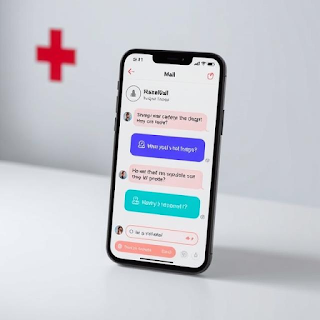
The healthcare industry is undergoing a seismic shift, driven by the rapid advancements in artificial intelligence (AI). From improving diagnostic accuracy to transforming patient communication and accelerating drug discovery, AI tools like ChatGPT and other machine learning models are reshaping modern medicine. As healthcare systems worldwide grapple with rising costs, physician shortages, and increasing patient demands, AI offers innovative solutions to enhance efficiency, reduce errors, and deliver personalized care.
This blog explores the groundbreaking applications of AI in healthcare, focusing on medical diagnosis, patient engagement, and pharmaceutical innovation. We’ll examine real-world examples, current challenges, and the future potential of AI in revolutionizing patient outcomes.
AI in Medical Diagnosis: Enhancing Accuracy and Speed
One of the most promising applications of AI in healthcare is medical diagnosis. Traditional diagnostic methods rely heavily on human expertise, which, while invaluable, can be prone to errors due to fatigue, cognitive biases, or incomplete data. AI-powered diagnostic tools, however, can analyze vast datasets—including medical images, lab results, and electronic health records (EHRs)—with unparalleled speed and precision.
 |
| AI systems like DeepMind help doctors identify abnormalities in medical scans with incredible speed and precision |
For example, Google’s DeepMind has developed AI models that can detect eye diseases like diabetic retinopathy from retinal scans with accuracy comparable to specialists. Similarly, IBM Watson Health has been used in oncology to analyze patient records and suggest personalized cancer treatment plans by cross-referencing thousands of research papers in seconds.
AI’s ability to recognize patterns in medical imaging is another game-changer. Radiology AI tools, such as those from Zebra Medical Vision, assist doctors in identifying early signs of conditions like lung cancer or fractures in X-rays and MRIs. These tools don’t replace radiologists but act as a "second pair of eyes," reducing misdiagnosis rates and improving patient outcomes.
However, challenges remain, including regulatory hurdles and the need for diverse training datasets to avoid algorithmic bias. Despite these obstacles, AI-driven diagnostics are becoming indispensable in modern medicine.
AI in Patient Communication: Bridging the Gap Between Doctors and Patients
Effective communication is the cornerstone of quality healthcare, yet many patients struggle with understanding medical jargon, accessing timely care, or managing chronic conditions. AI-powered chatbots and virtual assistants like ChatGPT are improving patient engagement by providing 24/7 support, answering health queries, and even triaging symptoms.
For instance, Babylon Health uses AI chatbots to conduct preliminary symptom assessments, directing patients to the appropriate level of care—whether it’s self-management, a telehealth visit, or an emergency room. This reduces unnecessary hospital visits and alleviates strain on healthcare systems.
Another breakthrough is AI’s role in mental health. Apps like Woebot, an AI-powered therapy chatbot, offer cognitive behavioral therapy (CBT) techniques to users experiencing anxiety or depression. While not a replacement for human therapists, these tools provide immediate, scalable support, especially in underserved areas.
Despite their benefits, AI communication tools must navigate ethical concerns, such as data privacy and the risk of misinformation. Ensuring these systems are transparent, secure, and HIPAA-compliant is critical for widespread adoption.
AI in Drug Discovery: Accelerating the Path to New Treatments
The traditional drug discovery process is notoriously slow and expensive, often taking more than a decade and billions of dollars to bring a single drug to market. AI is reducing this timeline by predicting molecular interactions, identifying potential drug candidates, and optimizing clinical trials.
Insilico Medicine, a leader in AI-driven drug discovery, used generative AI to design a novel drug for fibrosis in just 18 months—a process that typically takes years. Similarly, BenevolentAI leverages machine learning to repurpose existing drugs for new conditions, such as identifying baricitinib as a COVID-19 treatment.
AI enhances clinical trials by identifying suitable participants through EHR analysis, predicting patient responses, and monitoring adverse effects in real time. Companies like Deep 6 AI use natural language processing (NLP) to match patients with trials faster, speeding up research and improving diversity in study cohorts.
While AI holds immense promise, challenges like regulatory approvals and the need for high-quality biological data persist. Collaboration between AI firms, pharmaceutical companies, and regulatory bodies will be key to unlocking AI’s full potential in drug development.
The Future of AI in Healthcare: Opportunities and Ethical Considerations
As AI continues to evolve, its healthcare applications will expand into predictive analytics, robotic surgery, and personalized medicine. Predictive AI models, for example, could forecast disease outbreaks or individual health risks based on genetic and lifestyle data, enabling preventive care.
However, ethical dilemmas must be addressed. Algorithmic bias—where AI models trained on non-diverse datasets produce skewed results—can exacerbate health disparities. Transparency in AI decision-making is another concern, as "black box" algorithms can make it difficult for doctors to trust or explain AI-generated recommendations.
Regulatory frameworks, such as the FDA’s guidelines for AI in medical devices, are emerging to ensure safety and efficacy. Meanwhile, healthcare providers must balance AI adoption with human oversight, ensuring technology complements—not replaces—the clinician’s expertise.
Conclusion
AI is transforming healthcare, offering solutions to long-standing challenges in diagnosis, patient communication, and drug discovery. From AI-powered radiology tools to virtual health assistants and accelerated pharmaceutical research, the potential to improve patient outcomes is immense.
Yet, successful integration requires addressing ethical, regulatory, and technical hurdles. By fostering collaboration between technologists, clinicians, and policymakers, we can harness AI’s power responsibly, ushering in a new era of smarter, faster, and more equitable healthcare.
The future of medicine is here, and AI is at its heart.
External Links: To authoritative sources (FDA, WHO) and case studies (DeepMind, Insilico Medicine).
Thank you for taking the time to read this. We hope you found the information valuable.
Your feedback is important to us, so please feel free to share your thoughts in the comments section. We appreciate your engagement!


